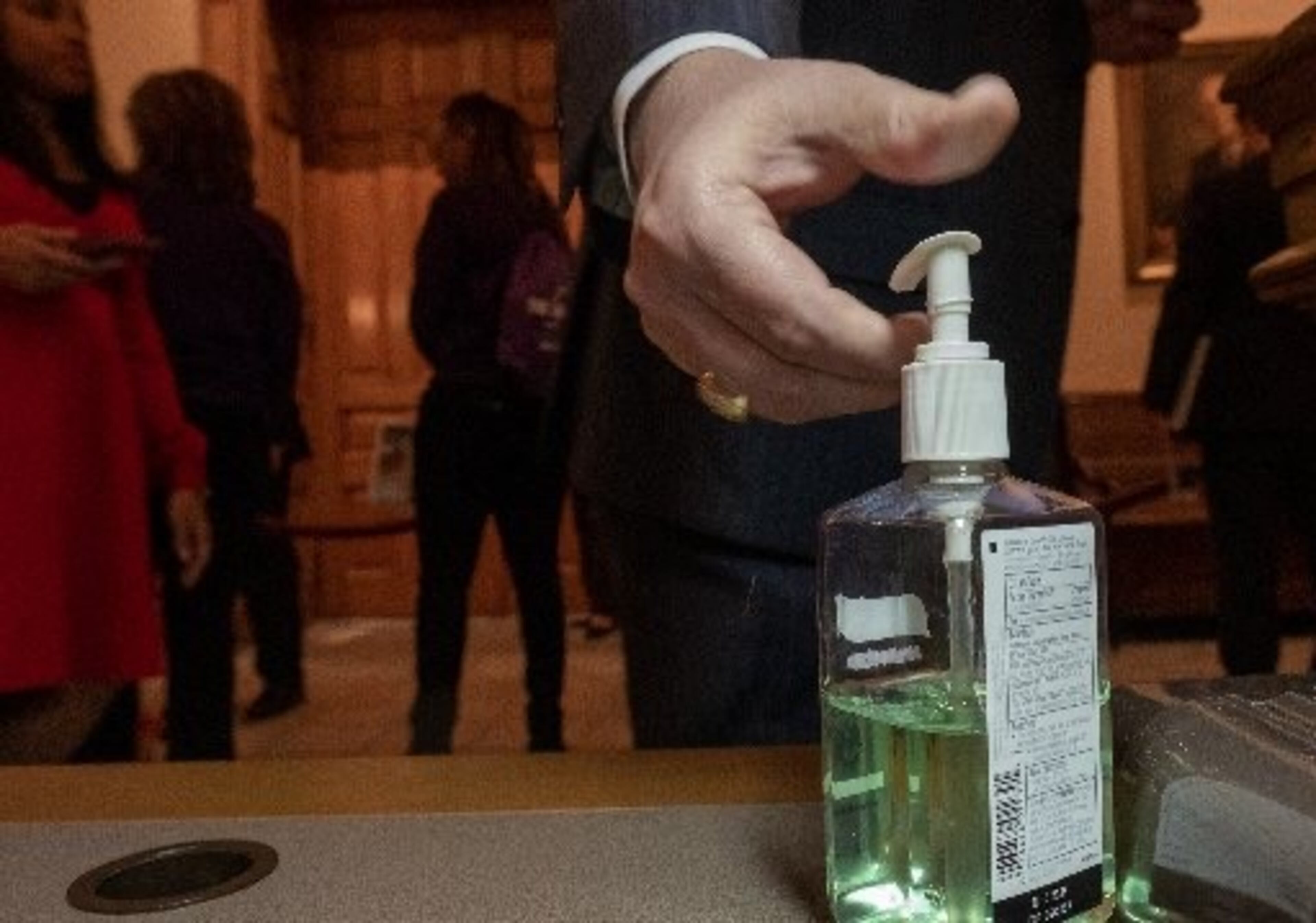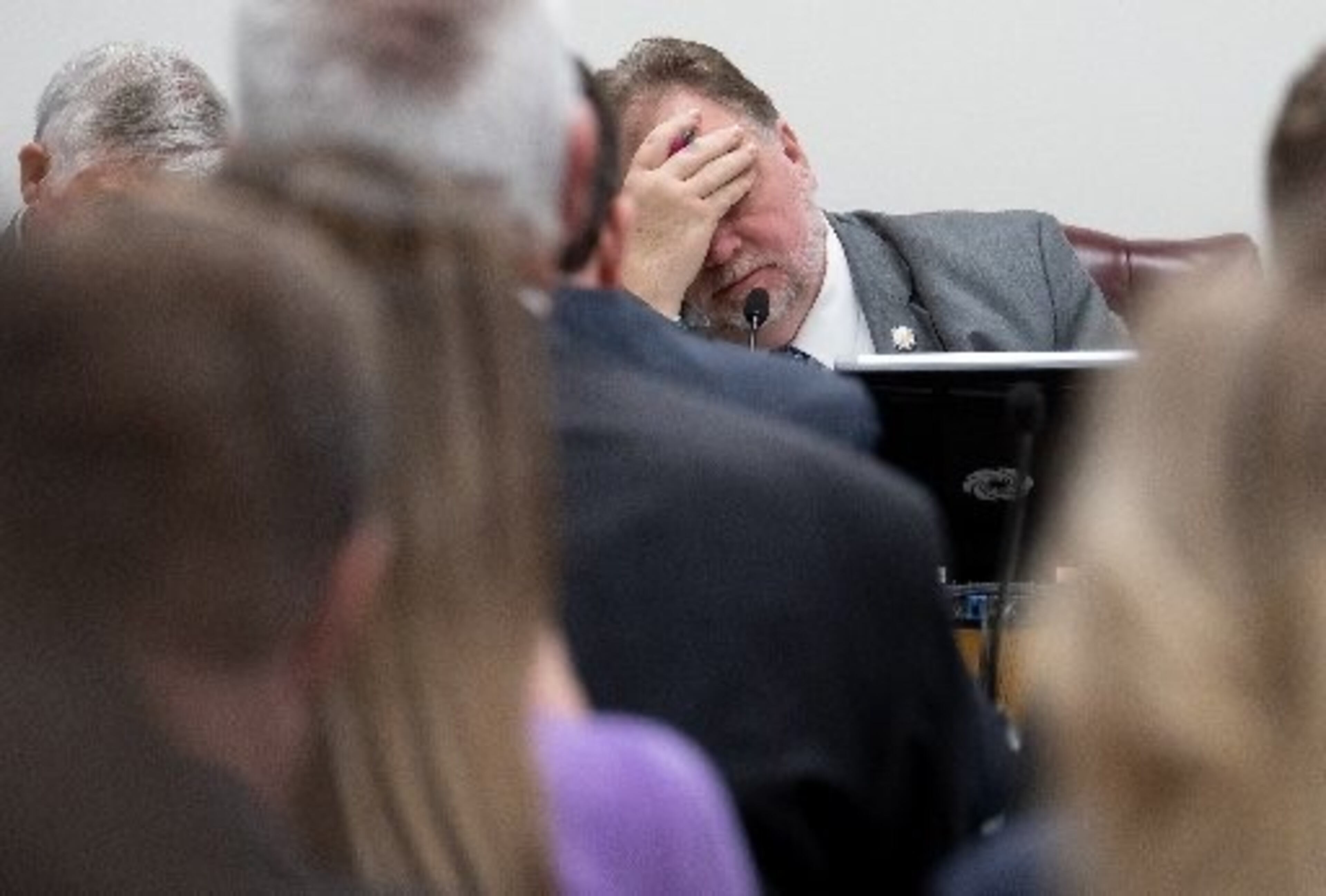‘It’s surreal.’ Coronavirus casts a pall on Georgia politics

With hundreds of Republicans packed into the same tight space for a rally for U.S. Sen. Kelly Loeffler, the question was bound to come up: Should candidates even hold such a crammed event with concerns about the spread of coronavirus?
Former U.N. Ambassador Nikki Haley, on hand to endorse the Georgia senator, downplayed the concern. But it underscored how coronavirus, which has sickened more than a dozen people in Georgia and triggered other widespread changes, is also shadowing the state’s politics.
Over the past week, Gov. Brian Kemp has held near-daily press conferences to urge calm and fend off questions about canceling events, while saying he still keeps up a steady regimen of hugs and handshakes.
Elections officials are under scrutiny in case the spread of the illness complicates Georgia's March 24 presidential primary, the first time the state will roll out expensive new touchscreen voting machines.
House Speaker David Ralston took steps Tuesday to limit visitors to the crowded chamber, suspending the student page program and other guest groups, and urged the public to watch Capitol happenings online instead of visiting in person.
U.S. Rep. Doug Collins “self-quarantined” himself after discovering he interacted with someone with coronavirus at a conservative conference two weeks ago — and was forced to notify the White House since he was in close contact with President Donald Trump a few days ago.
And there have been more subtle changes at the Statehouse, where lawmakers, lobbyists and staffers jumbled under the same Gold Dome are starting to swap back-slapping and glad-handing for a more arm's-length approach. The elbow tap has fast become a preferred means of greeting one another.
“People in politics aren’t any different than those working retail or in restaurants,” said John Simpson, a lobbyist. “We can’t do our jobs without meeting people face to face. So that is naturally going to put folks on edge and cause people to be hyper-vigilant.”

Doorkeepers manning the giant entryways to the House and Senate have taken note. They say they’re more frequently wiping down the clunky brass handles to each of the doorways, and they report that lawmakers are ditching handshakes for other methods of introduction. A few even have taken to gently bumping toes.
As if to exemplify the trend, Republican state Rep. Terry Rogers pulled out an Emory Healthcare-branded hand sanitizer he now keeps firmly in his right pocket. He's not worried about the illness, he said, but some in his northeast Georgia territory are getting antsy.
“I’m going to cut a short video this week to let people in my district know not to panic but to exercise caution,” he said.
The political debate over the coronavirus has generally divided lawmakers between "overreaction and not enough response," said Democratic state Rep. Erick Allen, though it has yet to spill over into legislative action in a major way. Kemp said recently that he's not yet ready to ask lawmakers for specific legislation to aid the state's response.
Some Capitol denizens saw a silver lining. Several female lobbyists said the hypervigilance gave them a much-needed reprieve from awkward hugs from male lawmakers. Others said the threat of illness could have given lawmakers a new impetus to speed up their work over a tense 40-day session.
"It's surreal. It's like a bad episode of '24,' " Jay Morgan, a longtime lobbyist and Capitol insider, said, referring to the race-against-the-clock TV thriller.
"The clock is ticking here, too," Morgan said. "Maybe it's one of the reasons they've accelerated the pace here so we can get out and all self-quarantine."
(Jokes, meanwhile, flew widely: Some quipped that politicians were safe since children seemed less likely to get sick from the illness. Others laughed that they already had to take a soapy shower after a day in the halls of Statehouse.)
Hugs and handshakes
The governor, who has frequently warned of the spread of the disease in Georgia, said in an interview that he hasn't abandoned the personal touch during regular meetings with visiting groups.
“I spent an hour taking pictures with different individuals today, and I shook a lot of hands and gave a lot of hugs. But I was also washing up afterward,” he said. “I’m not changing my daily routines now, but I’ll be transparent if that changes.”

That echoes Trump, who during a visit to Atlanta last week said he's "not at all" changing his personal behavior and also not considering canceling political rallies.
“I walk in, and the doctors have their hands out: ‘Hello, sir. How are you?’ ” he said during a tour of the U.S. Centers for Disease Control and Prevention. “If you don’t shake hands, they’re not going to like you too much. And I guess that’s my business. I never thought I’d be a politician. I guess I’m a politician.”
Pictures of one particular handshake of his circulated on social media Monday after Collins, a close Trump ally and U.S. Senate candidate, disclosed he would isolate himself for a few days after he discovered he was exposed to someone at the Conservative Political Action Conference who tested positive for the virus.
Collins, a four-term congressman, stood next to Kemp on the Air Force One receiving line at Dobbins Air Reserve Base on Friday and gave Trump a hearty welcome. He later joined Kemp and U.S. Sen. Kelly Loeffler, whom he is challenging in November, on the CDC visit.
Loeffler and Collins were in such close quarters that she released a statement Tuesday saying she will not self-quarantine after consulting with her doctors. Kemp quipped that the only symptom he suffers is "lack of sleep."
And Secretary of State Brad Raffensperger, who is preparing for a March 24 primary, asked poll workers to provide hand sanitizer to voters before and after they cast ballots to try to prevent the spread of the virus.
"We want to have a clean, sanitized environment when you're at a polling location," Raffensperger told The Atlanta Journal-Constitution. "Everyone needs to be as cognizant and safety-conscious as possible."
Other state leaders, too, took measures to show they were not caught off guard. Ralston, the top Republican in the House, urged the public “in the strongest possible terms” to watch the live streams of the chamber instead of visiting the Capitol. Left unmentioned was the fact that subcommittee meetings and other key panels are untelevised.

“We’re not being alarmist, but we are being cautious,” he said. “I don’t think we can be too cautious at this point in time with what we’re dealing with.”
At Loeffler's event, the first major political rally in Georgia since cases of the illness were first confirmed in the state, several of the roughly 400 attendees predicted such large-scale gatherings might be put on hold within a few weeks. Haley, the former governor of South Carolina, was not one of them.
“I think that what we need to say is be smart about how you live your life, but don’t change the way you live your life,” she said. “We are still going to go on like free Americans — and that’s what we should do.”
Staff writers Amanda Coyne, Ariel Hart and Mark Niesse contributed to this article.



